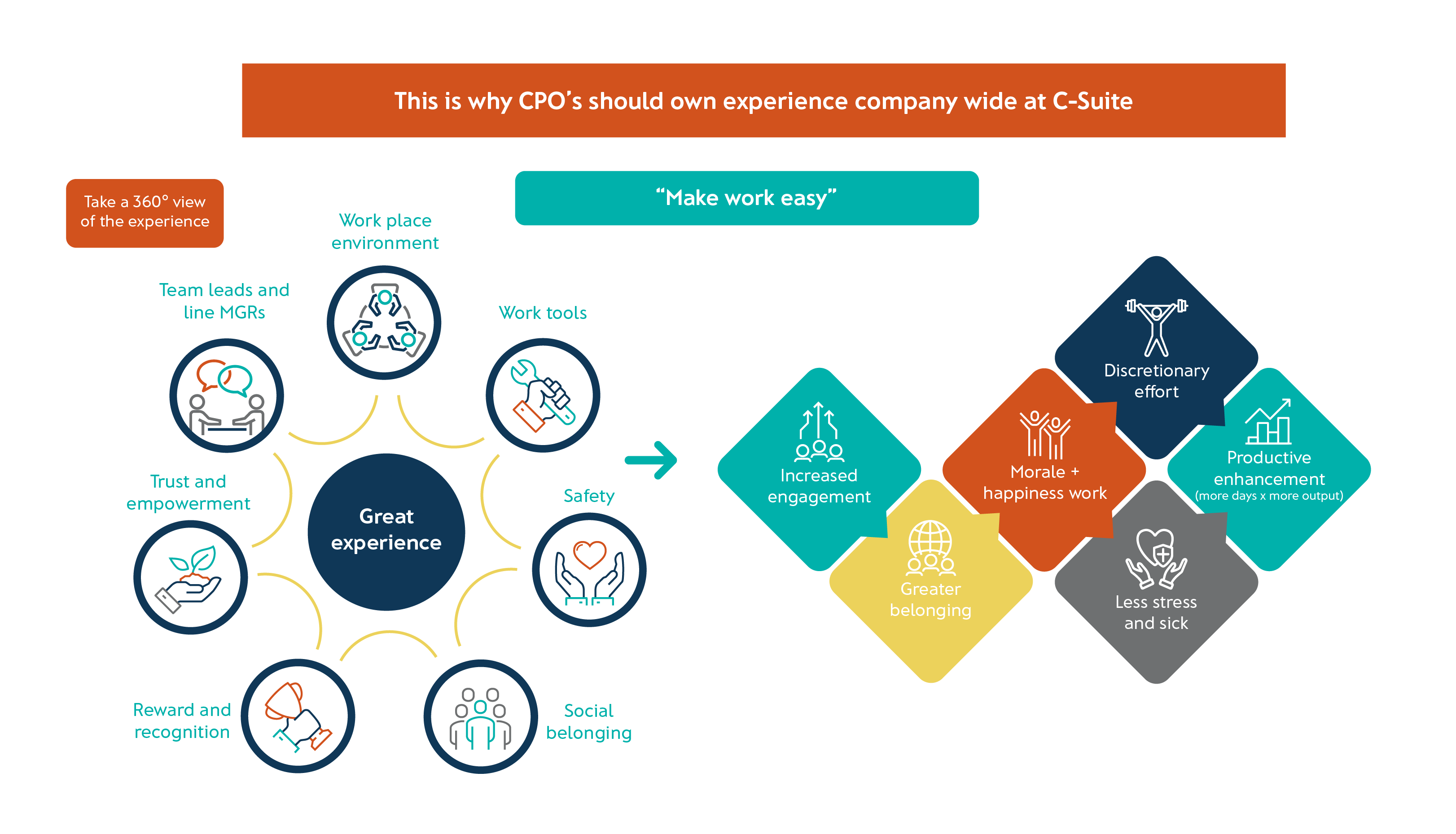We recently ran our latest Chief People Officer (CPO) forum, in which we discussed a manner of different topics from CPOs from a variety of industry sectors and sizes. The discussion was great and included fascinating debate around who should own employee experience, or at least have overarching accountability for it.
This April we launched our workforce productivity campaign and in the coming weeks and months we’ll be looking at a variety of different elements with which organisations can look to drive greater workforce productivity in their business.
Today’s blog focuses around a model that we’ve created off the back of client feedback. It looks at why the CPO should be the one who ‘owns’ C-Suite accountability to drive greater EX, and what that really means if taken to its logical conclusion. We’ve featured some great podcasts on EX, including thoughts on EX here, but following the CPO debate we’ve identified some key elements of delivering great employee experience, as well as why the CPO should be at the forefront of driving it within your organisation. Aaron Alburey elaborates on the model, which we’ve listed below.

CPOs delivering on productivity
As a CPO, the experience of your employees and your workforce should be owned at a c-suite level, because, if not you then who? Yes, others are responsible for some aspects but there needs to be one Exec accountable for the collective impact that has on experience. Great experience supercharges productivity and innovation; if you start thinking as a CPO “what are all of the different elements of delivering on the experience of our people that I need to have a view on?”, the seven elements listed in the first part of the model listed above are key.
- Work place environment – do your people feel happy with the physical workplace? Either at home or in the office/place of work? Does the workplace optimise your productivity and enhance your values? How is it working now in a hybrid world?
- Work tools – Do the tools you give your people to do their job allow them to deliver their best work? Or do they frustrate them because there are too many, that are complex, slow them down?
- Safety – Does being in the work environment make your people feel safe? Not just from a health and safety perspective, but also from a psychological safety perspective, that they can feel like they can truly be themselves at work?
- Social belonging – Do your people feel connected enough to their peers, to other people in the business, to the ethos and culture of the business? How can this be improved in a hybrid environment?
- Reward and recognition – What can you do to drive a greater culture of continual recognition and ensure Reward is seen as fair? Fair is often enough, and recognition doesn’t have to be financial.
- Trust and empowerment – Do your people feel like they can make decisions, be innovative and have the belief from their line managers and the wider business?
- Team leads and line managers – Do you have the skills in your leaders and team leads to engage and make the right decisions relating to your teams, and to optimise their performance?
Make work easy for people
As the world of work continues to evolve and businesses continue to embrace the increase in digital tools available to their businesses, organisations are beginning to recognise that workforce productivity through an improved digital employee experience can have a significant impact on performance of individuals. There are tools that enable your business to empower people from a 360 degree perspective; giving you a real view on how your people are engaging with all of the tools they use day-to-day, which enables you to spot patterns and trends in performance and work towards mitigating any frustrations an employee has.
Great experience is great engagement is great productivity
If you are clear and explicit in delivering on the ‘deal’ that you set out to your employees and you deliver on those expectations, it will contribute towards their overall happiness at work and their engagement, which has a knock-on effect on morale as people give more at work.
Increased engagement has a positive impact on overall wellbeing, on aspects like reduction in sickness, etc. If those factors combine, then it is well documented that it helps drive productivity and innovation, through discretionary effort (“going the extra mile”) and having more days available due to reduced sickness and greater wellbeing at work.
This is why it is important that, as the CPO, you need to own the overall ‘experience’ of people within your business. If you can ‘move the dial’ on all of the factors mentioned above, then you can deliver on productivity gains in your business.
Then the focus becomes on measurement. Organisations that can find effective ways to measure the baseline of the experience of their people and make the link between the different elements mentioned above, are able to demonstrate the link between experience and productivity and the shift getting this right can make over time.
If you’d like to find out more about how we can help you in demonstrating the link between experience and productivity, reach out to us using the form below.






